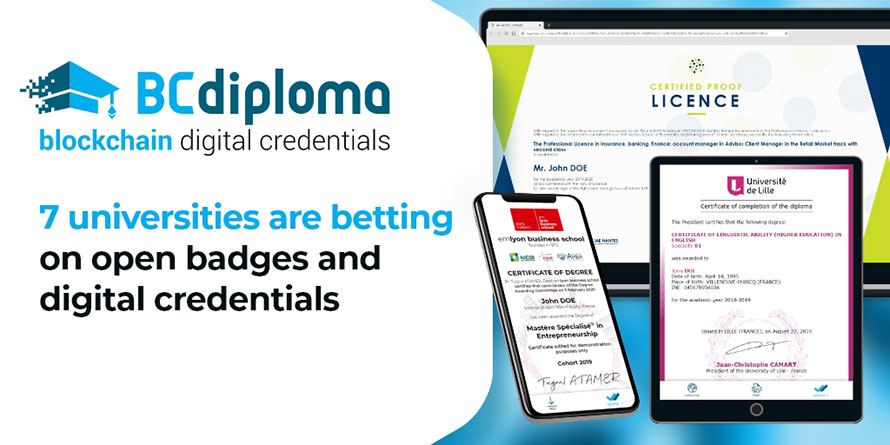According to a study by the Florian Mantione Institute, 29% of applicants are claiming false diplomas or misleading qualifications.
Faced with the scourge of false diplomas and following the recent vocational training reform, some French universities have turned to digital credentials to certify, dematerialize and deliver their learning and diplomas in a sustainable manner.
What are these pioneering universities that have chosen open badges and digital credentials for their graduates? BCdiploma takes a closer look at these innovative schools and explains how they make the most out of these new technologies.
What are digital credentials and open badges?
Definitions
Digital credentials are digital certifications or certificates issued by a specific institution: diplomas, skills, transcripts, etc.
Digital open badges are more specific: they are digital credentials that value and attest to the mastery of skills (specifically soft skills). They are a form of micro-digital credentials.
In the context of recent reforms, universities must organize their courses into different modules, called “blocks of competences”. Each of these blocks or units attests to the mastery of a specific skill, and can be certified with an open badge. Once all blocks have been validated, the student is awarded a digital credential for their degree.

What are digital credentials used for?
Digital credentials for students allow them to receive a permanent certificate for their diploma or learning a new skill.
Based on blockchain technology, digital credentials can be stored more easily than a paper document, and are fully secure, forgery-proof and verifiable. Discover more about digital credentials: 3 reasons to choose blockchain.
By nature, any data entered on the blockchain can’t be altered or modified. Digital credentials built on the blockchain can help prevent CV or diploma fraud, which has become a key issue for both recruiters and schools.
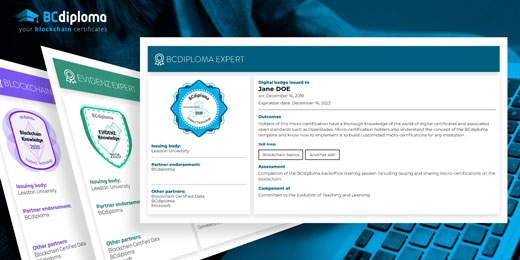
Exponential adoption of digital credentials
In 2020, the IMS Global Learning Consortium (a global NGO) and Credential Engine issued a report stating that 43,363,239 badges were issued worldwide in 2020. This equates to an 80% increase in just 18 months!
In France, networks have been formed and initiatives launched to promote the development of open badges:
- “Reconnaître-Open Recognition Alliance” in 2018;
- The platform “Les apprenants agiles” with the support of the Ateliers de pédagogie personnalisée (APP) network in 2018;
- The B.O.A.T network “Badges ouverts à tous − Reconnaître en Nouvelle-Aquitaine” in 2019.
Beyond the university and college framework, open badges and digital credentials are also growing at company level, with IBM fully integrating digital credentials into its employee training system.
1 − The University of Caen Normandy, a pioneering institution in issuing open badges
The University of Caen Normandy is very advanced in the field of micro-certifications: it has been developing open badges internally for its own training courses since 2016.
The university aims to value students’ skills to increase motivation and prevent dropouts. Since the French vocational training reform was introduced, the University of Caen Normandy has also been using open badges to certify skills acquired during the training courses that make up the degree’s various modules.
2 − Emlyon Business School and BCdiploma, a winning partnership popularizing digital credentials
Emlyon Business School is the first French business school to have 100% blockchain digital credentials for its students.
This system, which has been in general use since 2020, grants students a digital credential they can use throughout their professional lives to prove their diploma, and that can be shared across all digital media: CV, email, LinkedIn and other social media platforms.
Proving the authenticity of one’s diploma using blockchain digital credentials is a fantastic guarantee and time-saver for recruiters.
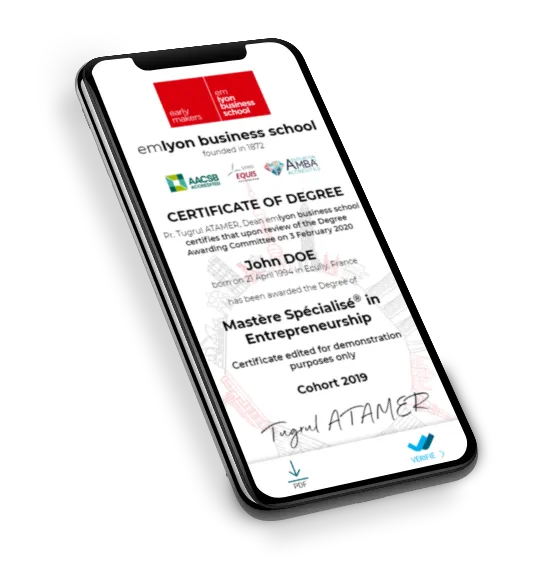
See an example of Emlyon Business School digital credentials
3 − Arts et Métiers Paristech is betting on blockchain certification
France’s largest engineering school is also a pioneer in innovation and digitization.
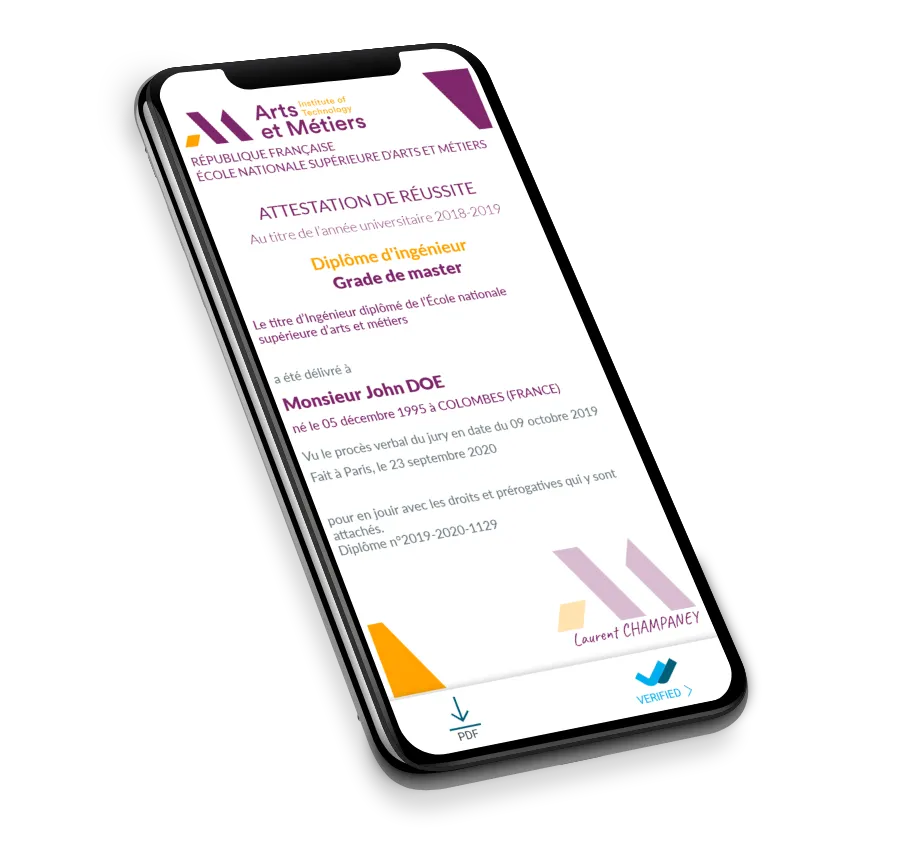
Arts et Métiers Paristech has chosen to dematerialize its diplomas in collaboration with BCdiploma to:
- optimize its administrative processes;
- dematerialize documents for immediate data access;
- secure student information.
Arts et Métiers Paristech started using blockchain certification for graduate certificates with the 2016 year group.
4 − The University of Nantes provides its alumni with digital credentials
IAE Nantes School of Economics and Management has been certifying its students’ diplomas in collaboration with BCdiploma since 2017. Its certifications are directly available on its “AlumnForce” alumni platform.
AlumnForce is the first alumni platform to provide BCdiploma’s blockchain in education service so that graduates can receive their diplomas and certificates in a digital, forgery-proof and multilingual format.
With great added value: in 2018, BCdiploma’s digital credentials led to a 20% increase in registrations on the University of Nantes’s Alumnforce platform.
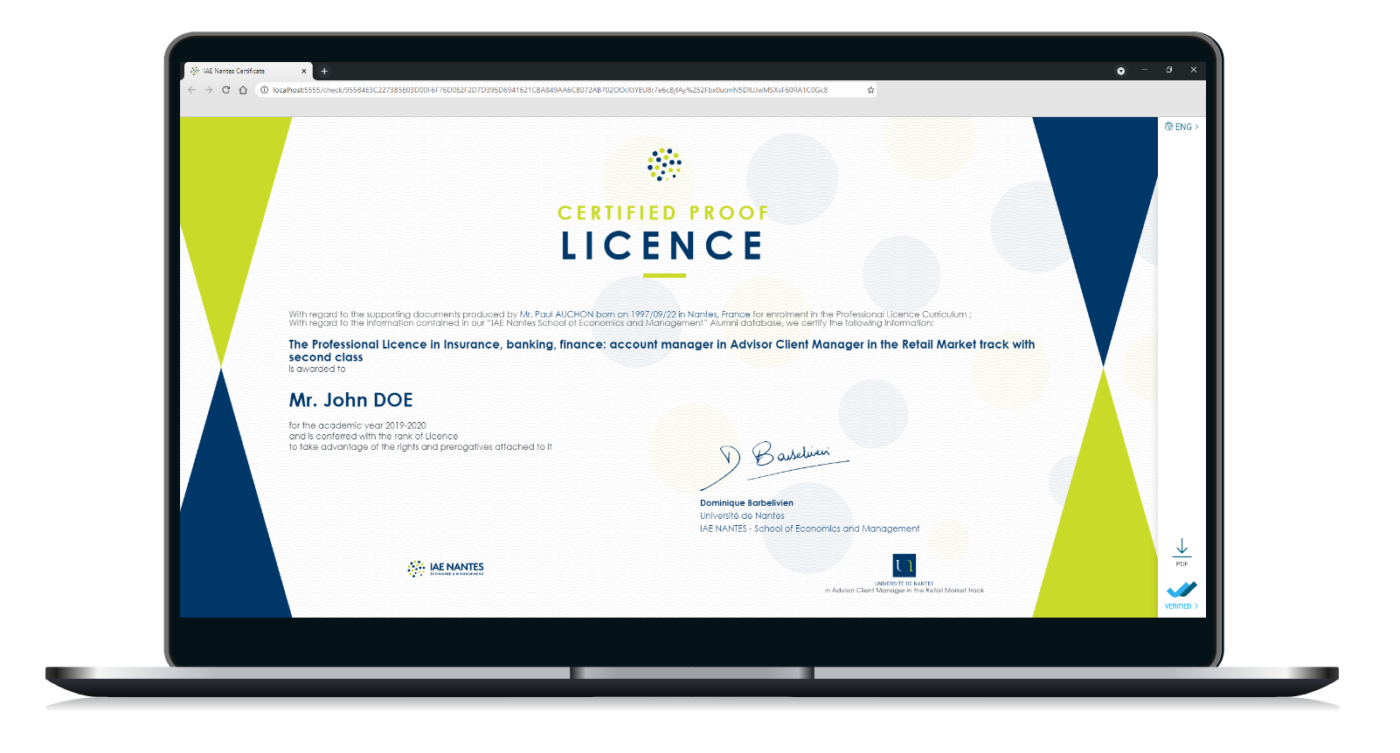
5 − The University of Bordeaux: 6 open badges to recognize students’ achievements
In 2020, the University of Bordeaux implemented open badges to value its students’ extracurricular experiences.
These experiences can be tied to students’ commitments, parallel training courses such as MOOCs or various life skills.
Here are the six open badges currently issued by the University of Bordeaux:
- OpenMind: attests to the ability of students to design and manage a project as well as adapt to a new context;
- HackeTaFAC: certifies the implementation of a digital innovation project for the benefit of the campus;
- Tremplin: attests to students’ ability to outline a project and a career path adapted to their needs;
- Bibliologue: attests to the knowledge and use of resources from the various libraries available;
- BeGlobal: recognizes students’ commitment to an international experience and certifies their ability to network with people from different backgrounds, as well as their ability to take on social and professional codes within an international environment;
- Welcome2U: promotes mutual aid, interpersonal skills, selflessness and the ability of students to communicate in a specific and intercultural context.
6 − The University of Suffolk sets up an open badge generator
The University of Suffolk has created an open badge generator to manage the creation and delivery of open badges for a number of events and workshops held by the institution.
A student attending a university event can earn an open badge by explaining how they will apply the concepts gathered in the session to their own work or studies.
7 − The University of Lille, a pioneer in European standard digital credentials
Since 2020, the University of Lille has launched two large-scale blockchain projects. The first, DemattestULille, aims to provide all graduates of France’s largest public university with blockchain certificates of graduation. The second, Fr.EBSI, is a national and European project that will extend the digital credentials service to the W3C Verifiable Credentials standard.
These two projects are being carried out with the help of BCdiploma’s teams under the supervision of Perrine de Coëtlogon, University of Lille, Blockchain & Open Education, and Pierre Boulet, Vice-President of Digital Transformation at the University of Lille.
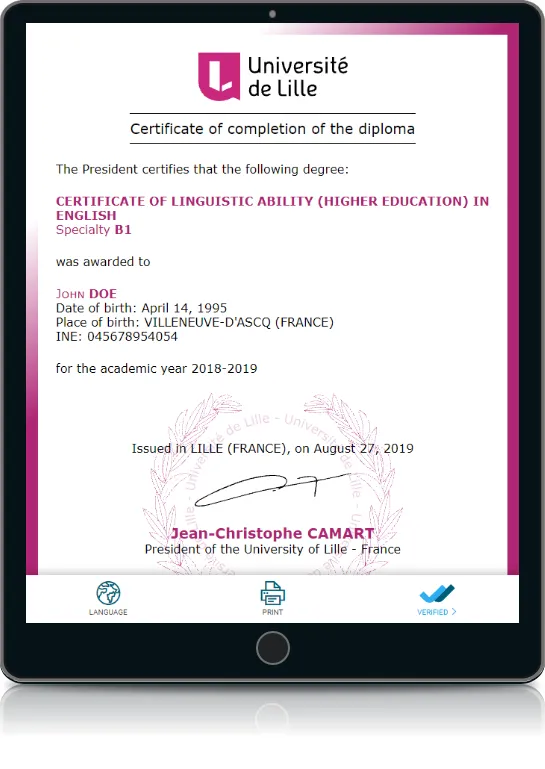
Learn more about the blockchain projects carried out at the University of Lille
BCdiploma’s 100% blockchain digital credentials
BCdiploma has developed the very first 100% blockchain digital credentials and open badges.
BCdiploma’s blockchain digital credentials not only dematerialize diplomas, but also make them accessible throughout students’ professional lives in a secure and non-forgeable way.
Today, more than 100 institutions in 18 countries issue BCdiploma’s blockchain digital credentials and demonstrate a real commitment to this innovation:
- 86.5% of students expressed the desire to earn these “blockchain digital credentials” throughout their future studies;
- 87.1% value their institution’s initiative;
- 73.9% claim that their 100% digital credential proved useful in an interview;
- Their favorite feature is the proof of authenticity included in the online micro credentials;
- 81.2% would recommend BCdiploma certificates to others.
